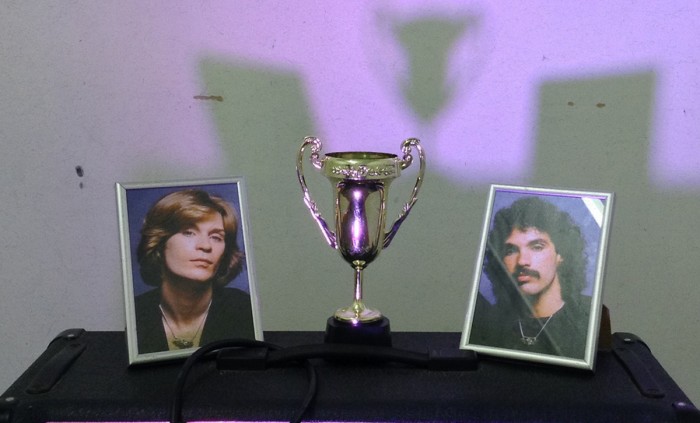It’s fair to say this year started well. Whereas January is usually a barren month for exciting new releases, 2015 kicked off like Gennaro Gattuso after a bowl of chillies, with the brilliantly fluid, acid-laced synth-pop of Ghost Culture’s eponymous debut album seeming to arrive just a few seconds after the last NYE firework exploded.
A week later came Panda Bear Meets The Grim Reaper, an album which may just surpass every record Noah Lennox has ever been involved with. Bounding after it like a particularly imposing post-rock hound was Disappears’ fifth (and best) album to date, which blew off not just the socks I was wearing but obliterated all the ones in my sock drawer too. I may have spent the rest of January barefoot, but my ears had never been happier.
2015 has pretty much carried on like that. While those three albums would probably still be in my top five of the year so far, every week has brought an uncommonly high quantity of great records. Perhaps it’s just down to the comparative ease of creating, releasing and circulating albums in the digital age, but if that means continuing to receive a constant deluge of great music then that’s fine by me. (Of course, it also means I’m consistently bombarded with an even greater deluge of long-playing shite, but the good stuff makes that a lot easier to ignore.)
This is part of the reason why we feel the need to post this list every July. Frankly there are just too many records to review, or even listen to, at the time they’re actually released, and some of them get unfairly forgotten about when the end-of-year lists come around. Some of the following albums are ones we’ve already gushed about extensively, others are ones we’re writing about for the first time. While it’s unlikely any of our readers (or writers) will adore every one, all are ambitious, authentic, and aim to leave a scorching impression behind.
One thing we can all agree on is that this list could’ve been four times longer before any barrel-scraping would’ve occurred. If the rest of the year continues in the same vein, perhaps we’ll finally be able to put to bed the fallacy that modern music pales in comparison to some fêted, half-imagined, sepia-tinted golden age, as we realise we’re in a golden age right now.
And if that sounds like a pretentious and bombastic statement, well, our best albums of 2015 list begins with a loud, crude, balls-out record featuring songs about prostitutes having it off in your garden, men who wrestle snakes, and having to steal a Tonka truck from Toys ‘R’ Us because your parents wouldn’t get you one. Because in 2015 there’s room for a bit of everything.
But primarily for the 25 following records…
Kier Wiater Carnihan
“Psychological explorations? Sensitive portraits? Ha, only joking you mad fool. This album is as philosophically deep as Bono’s eardrum. It’s called Bad Guynaecology for fuck’s sake. If you were expecting Baudelaire or Bertolt Brecht then you’d be in for a very rude surprise wouldn’t you, with that title, a very rude surprise indeed…” Luke O’Dwyer (Read our full review here)
Benoît Pioulard (aka Thomas Meluch) has been releasing records full of clouded tones and blissfully frosted ambience for many years now, but Sonnet is my favourite album of his to date. It’s a quietly audacious attempt to capture fragments of vivid dreams and recreate the sound of “whistling industrial air conditioners, bird songs, locust drones [and] washing machines” using only analogue tapes and guitar pedals. Apparently Meluch used to keep a collection of field recordings under his bed, which he’d play to inspire beautiful dreams as he slept. Sonnet gives us all the means to do the same. Kier Wiater Carnihan
Everyone seems to be obsessed with the emotional openness of Björk’s prematurely released break-up album, but I don’t really care for lyrics. What I noticed is a stunning retrospective through the best textures of her past records. The stark loneliness of Medulla‘s vocal stylings layered over the overwrought emotional strings of Homogenic, and the tiny but elegant percussion of Vespertene. Basically, it sounds like a greatest hits filled with tracks you’ve never heard before. Lush as fuck. Alex Allsworth
“Every track is delicious: rich in texture, intelligent in rhythm, measured in its application of build-up and release. The sound of the melodies falls somewhere in between Scooter and dial-up internet, but I’m okay with that. The tuned bass drum riff of ‘No Lite’ is one of the most addictive noises I’ve heard all year, and Benjamin John Power masterfully builds a web around it and ekes out every last bit of goodness over nearly ten minutes. With that waste-not-want-not mentality, I’d bet he makes a mean chicken stock too.” Emma Hall (extract from this piece)
“As an emotive work of art it’s unlikely to be bettered this year… noted for a wider dynamic range than either [Stetson or Neufeld’s] solo work, with several softer, gentler moments pillowing the more fervent sections. The reflective title track is particularly moving, spilling wounded melancholy through simple phrases and showing that the neither musician has to rely on instrumental virtuosity to enrapture their listeners.” KWC (read our full review here)
Dan Deacon is renowned for his notoriously playful live shows: cacophonous helpings of organised chaos that typically climax with the audience forming a giant, self-cannibalising conga line. As such, the notion of a “more mature” DD album might fill you with horror, and yet Gliss Riffer finds Deacon at the peak of his powers. His tiered creations retain their lofty messiness, but they also show off unprecedented levels of verve and self-belief. The results are thrilling. Neon Kelly
Obviously no one in Dawn Richard’s camp was advising on edits, as the self-released second LP from the New Orleans-via-Baltimore artist is a heck of a trek – and feels even more so due to the fact that individual tracks sound like three R&B EPs playing at once, sometimes at double speed. This ADHD approach to rhythms would sound clunky in other hands, but Richard (pronounced: ‘re-shard’) has managed to make a gloriously strange pop record instead. Nicholas Burman
“It’s a ghostly type of industrial music, in the sense that it echoes with the rattle and thump of heavy industry. Brian Case’s barely intelligible murmuring provides a little human texture in the rhythmic fog, but it’s Damon Carruesco’s measured bass that provides the subtle engine underneath it all. If Irreal is a factory, then this is the sound of it being broken into by cloaked figures at midnight, while a thousand rats scatter into the shadows.” KWC (read our full review here)
Taking a step away from the immaturities of Odd Future’s work, the well-read Los Angeles MC/producer takes us down a dark road on I Don’t Like Shit, I Don’t Go Outside. Sweatshirt runs through a myriad of weed-induced paranoia over beats that call to mind the sparse grimace of Shabazz Palaces’ Black Up and Portishead. NB
The delicate yet headstrong debut solo album from Alexandra ‘Eartheater’ Drewchin is one of those records that feels like a real peek into its creators’ brain. The cluttered, lo-fi production adds a feeling of intimacy, like you’re listening to it in a bedroom full of scattered bedclothes, extinguished incense sticks, and sheets of intricate biro patterns scribbled down at the peak of a twelve-hour acid trip. From the bubbling folk of ‘Infinity’ to the cerebellum-tickling, ten-minute ambient spiral of ‘Orbit’, Metalepsis is an album that will leave you reeling. KWC
“All too often an artist gets the pulse racing with a couple of brilliant single releases, as Greenwood did with ‘Mouth’ and ‘Giudecca’ last year, only for the eventual album to reveal that they’d pretty much exhausted their creativity there and then. This record is so accomplished it not only fully delivers on the early promise, but suggests there is plenty left in the tank.” KWC (read our full review here)
Hip-hop jazz nerds BadBadNotGood must’ve thought they were living in fantasy land when producer Frank Dukes put them in a studio with Ghostface Killah for this exceptional collaboration. The Canadian trio were tasked with creating the sort of smoky, seventies soul and funk backing tracks that Wu Tang have always excelled in sampling, and they’ve done such a superb job that you almost have to check they’re actually originals. As for Ghostface, well, when you put Sour Soul alongside his imminent album with Adrian Younge, it’s clear that the 44-year-old rapper is in the richest run of form he’s enjoyed since the nineties. Belting. KWC
“It seems some sort of wonderful musical alchemy has occurred within the wired minds of London/Somerset noise-drone assaulters Hey Colossus… An evolution has been taking place, bubbling away in the darkness while you sat on your arse and watched Emmerdale Farm… With In Black And Gold it seems they’ve found the right balance of precision and force to strike the motherload. Just listen to surprisingly gentle Vangelis synth dream opener ‘Hold On’. It’s an absolute beast of an album and sees the band pushing their sound into far more emotive territories.” LO (extract from this piece)
Platform is similarly sample-orientated as the likes of Lakker, although a lot less dark and more interested in ideas (hear ‘Lonely At The Top’ for a dose of gender stereotypes). Holly Herndon’s first release via 4AD has put a lot more ears onto her, but taken her away somewhat from her core fan base; the rousing ‘Morning Sun’ and off-kilter epicness of ‘An Exit’ means that neither ends of her audience should feel cheated. NB
The French-Cuban sisters’ voices are dramatically restrained yet central within what is probably the best demonstration of XL’s Richard Russell’s in-house-production style since Gil Scott-Heron’s I’m New Here. So far it’s been a year dominated by promising, if patchy, debuts, and Ibeyi’s self-titled LP is no exception. Head straight to the quasi-spiritual ‘River’ for proof that Ibeyi deserve an opportunity to make good on that continent-straddling promise. NB
“Kendrick Lamar’s third album commits to an intricate dialogue in which he plumbs the troubled depths of both his personal inner conflict and a legacy of colonial race issues that bleed through to modern life. It can be challenging and maybe even overreaches a couple of times, but to dedicate an entire album to this level of depth is a bold move, and only Kendrick Lamar Duckworth (that’s right) could have ever pulled it off… on every listen it morphs and surfaces new meaning. All I know is, from what Kendrick’s saying, this rich and deeply thought-out album is another evolution of his message and a honing of his unique musical gift: ”… before I’m done with this, y’all gon say, ‘That boy, he did something else that we didn’t think no man could do in music.’” Amris Kaur (read our full review here)
“Clocking in at fifty-five minutes, and with very little to distinguish individual tracks from the overall composition of it as a long player, it’s certainly not the easiest record to get into in 2015. There’s no stand-out tune, no ‘banger’. But here is an academically minded electronica record which is enthusiastic enough about the outside world for it to have enough heart to make it as much a mood-building experience as a demonstration of purely technical abilities.” NB (read our full review here)
Considering it’s the 11th biggest country on the planet, it’s fair to say a history of colonisation and civil war has brutally stymied most possibilities of progress in the Democratic Republic of Congo. Musically, however, it has been the source of some exceptional post-millenium albums from the likes of Kasai Allstars, Konono No. 1 and Staff Benda Bilili. The central duo of Mbongwana Star, Yakala ‘Coco’ Ngambali and Nsituvuidi ‘Theo’ Nzonza, split from the latter band in 2013, but their new group Mbongwana Star shows they’re not looking backwards. With Tony Allen producer Liam Farrell completing the trio, From Kinshasa is an electric piece of work in every sense, stomping a new path in Congolese music with a questing, bass-heavy approach. KWC
Apparently when Panda Bear meets the grim reaper what we get is an album that sounds anything but grim. Full of comforting textures and harmonies, it’s as much of a spiritual experience as his past albums, but the concept makes the songs seem more meaningful as they envelop the listener with hymnal glimmers of hope, evoking visions of a day at the beach in outer space. Ellie Brennan (read our full review here)
This collaboration between Montreal four-piece Suuns and their musical mate Radwan Ghazi Moumneh (aka Jerusalem In My Heart) may have been a curveball, but it was an experiment worth taking. Art rock meets dystopian, Middle Eastern inspired experimentalism, the results are an often restrained but ultimately enlightening experience. NB
Leeds-based noise-punk bad-sods Super Luxury released their debut earlier this year and it’s a nasty, wonderful little shit. It’s likely to kick you in the shins and call you a prick before running off to set fire to some nearby bins, telling the onrushing coppers and fire attendants that it was actually you that started the fire. The obnoxious little fucker. It’s great. Go get it. LO
Thee Oh Sees are one of those bands who just seem to get better and better with every album, despite not ever seeming to change their approach much. Nonetheless, Mutilator Defeated At Last may be their most distinguished album to date. From the moment the drums on opener ‘Web’ suddenly switch from stomping to sprinting you know it’s going to be a winner, while six-minute centrepiece ‘Sticky Hulks’ is another mercurial beauty, gusting from wispy organ breezes to guitar-driven gales at a moment’s notice. Bring on album… twelve? Fifteen? Whatever it is, bring it on and bring it hard. KWC
Vessels have to be one of the most underrated live acts in the UK. A five-headed, double-drumming beast of a band, they’re like the Yorkshire equivalent of Caribou, or a ‘live group’ version of a Modeselektor or Jon Hopkins DJ set. Their third album proves their finest so far, building on the substantial groundwork laid by 2013’s impressive Elliptic EP, the title track of which reappears here and is as vitalising as ever. There’s never a moment that won’t be improved by watching Vessels perform, and there aren’t many that won’t be improved by sticking Dilate on your stereo either. KWC
Although short, the manifesto is clear and concise. It’s dark, it’s gloomy, it’s filled with panic. It’s completely cathartic and overwhelming, and oh so darn satisfying. ‘Silhouettes’ recalls the terrifying fear and panic the under-appreciated but fantastic Canadian post-punk outfit The Organ exuded with their music, whilst zooming at frantic speed, until before you know it they are howling and the high-pitched, unsteady synths are dripping down the walls. It’s frosty, it’s desolate, and boy, it’s desperate… Amadeep Chana (read our full review here)
You’re on the cusp of becoming the cult alternative act of your era, so what do you do? Announce an album with a controversial title which provokes response, but keep the content as solid as on your debut. White Men Are Black Men Too develops on the themes and styles found on last year’s full-length debut DEAD, but with a confidence and artistic integrity rarely heard. NB





Follow us
Follow us on Facebook Follow us on Twitter Follow us on Google+ Subscribe our newsletter Add us to your feeds